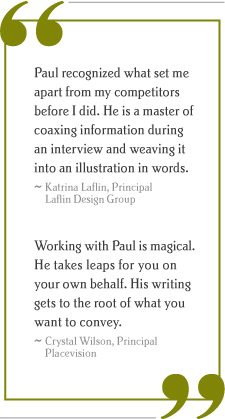Most of us know good writing when we see it. We know really good writing when it tells us what we didn't know. Especially about ourselves or our work. I approach every writing job as a challenge to find out what's different about the subject. And if the subject is a person or his or her business, the challenge is to get them to say, "I wish I'd said that."
It's almost never easy. For one thing, I don't buy the statement, "I know what I want to say, but I don't know how to say it." In my experience, people who make that remark really don't know what they want to say. I believe that many individual proprietors and large and small businesses really aren't sure what they want to say. And that it is my job to help them determine that before the actual writing proceeds. |
If the concept is foggy, the writing is likely to be no better even if it is grammatically correct. Or, to quote Truman Capote, it "isn't writing, it's typing." So what I aim for is not just "writing" but "writing with a strategy." Doing that usually involves getting beneath the surface of the subject and drawing out what they really mean, even before they realize it. Thirty-plus years in the newspaper business taught me something about what makes people tick, about what they really want in life. I have interviewed judges and felons, saints and sinners, cops and professors, union leaders and scientists, so I am comfortable talking to about anyone. I have worked with a variety of self-publishing authors, non-profit agencies, entrepreneurs, businesses and consultants, helping them find their own voice, their own story and their own audience. Whether the work involves company names and taglines, ghostwriting, Web sites, position papers, collateral or other media, I help them find what's different about themselves. It's always a challenge, but when I stop feeling that way I'll find something else to do. |
 |
